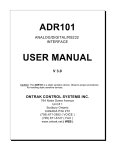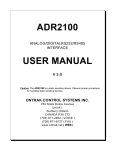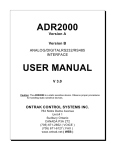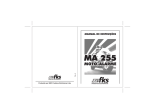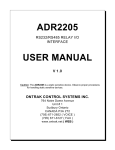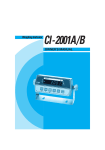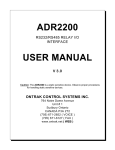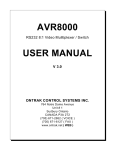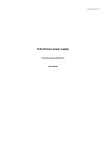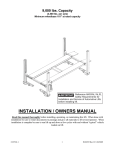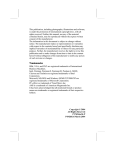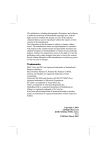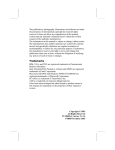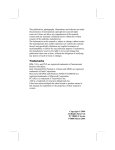Download ADR112 USER MANUAL - Ontrak Control Systems
Transcript
ADR112
ANALOG/DIGITAL/RS232
INTERFACE
USER MANUAL
V 3.0
Caution: The ADR112 is a static sensitive device. Observe proper procedures
for handling static sensitive devices.
ONTRAK CONTROL SYSTEMS INC.
764 Notre Dame Avenue
Unit # 1
Sudbury Ontario
CANADA P3A 2T2
(705) 671-2652 ( VOICE )
(705) 671-6127 ( FAX )
www.ontrak.net ( WEB )
Ontrak Control Systems Inc. reserves the right to change product specifications to improve the
product.
Although every attempt has been made to insure accuracy of information contained in this
manual, Ontrak Control Systems Inc. assumes no liability for inadvertent errors.
W arranty: This ADR112 is warranted from defects in workmanship and materials for a period of
90 days. Liability for defects is limited to the purchase price of the product. This warranty shall not
apply to defects resulting from improper modifications or use outside published specifications.
Hyperterminal and Windows are trademarks of Microsoft Corporation.
APPLE , MACINTOSH and MAC are trademarks of Apple Computer Inc.
PC, XT, AT, PS/2 are trademarks of International Business Machines Inc.
COPYRIGHT 1999 ONTRAK CONTROL SYSTEMS INC.
TABLE OF CONTENTS
READ ME FIRST
3
1. Communication options.
a) The ADR112 RS232 Interface.
4
2. Powering the ADR112
3. ADR112 Commands
a) Analog Input Commands
b) Digital Port Commands
5
7
7
7
4. Using BASIC with ADR Products
5. Using TURBO C with ADR Products
7. Interfacing to the ADR112 ( basic examples )
9
10
a) Reading Potentiometer Position
b) Connecting Switches to Digital Ports
c) Connecting LED'S to Digital Ports
d) Driving Solid-State Relays
e) Temperature Measurement
f ) 4 - 20 mA Current Loop Options
13
13
14
15
16
16
APPENDIX
A-CONNECTION DIAGRAM
B-ELECTRICAL SPECIFICATIONS
C-MOUNTING DIMENSIONS
ONTRAK CONTROL SYSTEMS INC.
2/19
17
18
19
www.ontrak.net
READ ME FIRST
Thank you for purchasing this ADR112, serial data acquisition and control
interface. There are three steps to using the ADR112.
1.Connecting a computer or terminal to the ADR112.
2.Providing power to the ADR112.
3.Sending commands to the ADR112.
This manual will provide guidance for completing these steps along with BASIC
and TURBO C programming tips. An applications section is also provided to
describe how to interface various electronic transducers and other devices to the
ADR112. Additional applications and programming examples are available on our
web page at http://www.ontrak.net/
FEATURES
-2, 12-bit analog inputs ( 0 -5 VDC )
-8 digital I/O lines individually programmable as input or output
-High current digital I/O lines ( sink 20mA/source 20mA )
-Three wire RS232 interface
-Low power requirements ( 5 volts at 15mA )
-Power-up via standard wall adapter ( optional )
-Simple yet versatile commands
-Easy to use with Visual BASIC or TURBO C programs
-Compatible with all ADR series interfaces
ONTRAK CONTROL SYSTEMS INC.
3/19
www.ontrak.net
1a)THE ADR112 RS232 INTERFACE
The ADR112 communicates via a standard RS232 port utilizing a simple three-wire interface. The
only signals used are received data (RC), transmitted data (TX) and ground (GND). Most RS232
ports use hardware handshaking (i.e. DTR, DSR, CTS, RTS) signals to control the flow of data on
the port. For this reason the cable required to connect to the ADR112 must have jumpers on the
DB25 end to satisfy these handshaking requirements. IBM or compatible computers may be used
as a host computer with the supplied cable. The supplied cable has the following connections;
Figure 1: Supplied Cable Wiring Diagram
If the host computer has a 9-pin serial port connector, a 9-pin to 25-pin adapter cable will be
required to connect to the ADR112 cable. This adaptor is available at most computer dealers. If
desired, the DB25 connector on the supplied cable may be removed and a female DB9S
connector can be soldered in its place using the following wiring diagram;
Figure 2 : Modified Wiring Diagram For 9-PIN SERIAL PORTS
If the host computer has a female DB25 connector, a male-to-male adapter is required to use the
supplied cable. This may be purchased at most computer dealers. Apple Macintosh computers
may be connected to the ADR112 using MAC to DB25 DTE conversion cable.
Once connected to the RS232 based host computer or terminal, the RS232 port should be
configured to the following specifications to allow communication with the ADR112.
9600 baud - 8 bit words - 1 stop bit - no parity
If using BASIC or C consult the appropriate section in this manual for details on how to configure
your serial port. If a terminal or terminal emulation program is used, configure your terminal to the
above specifications using the operations manual for your terminal equipment or terminal
emulation program.
ONTRAK CONTROL SYSTEMS INC.
4/19
www.ontrak.net
2.PROVIDING POWER TO THE ADR112
The ADR112 may be powered using a regulated 5 volt power supply or a suitable wall adaptor.
POWER-UP USING A 5 VOLT REGULATED SUPPLY
If the ADR112 is to be powered using a regulated 5 volt
power supply, the 5VDC and GND connections are to be
made to the ADR112 via the main terminal block TB1.
The supply must be able to provide a minimum of 30 mA
and up to 130mA if the ADR112 is to source current from
the digital outputs. Care must be taken to avoid
improper pow er supply connection as permanent
damage to the ADR112 may result if connected
improperly. No connection to J2 is to be made if the
ADR112 is powered by a regulated 5 volt supply.
For safe operation the total current sourced by
digital I/O should not exceed 100mA.
POWER-UP USING A WALL ADAPTOR
The ADR112 has an on-board 5 volt regulator allowing
the use of a 9-volt wall adaptor to power the internal
circuits. The regulator should be able to provide from
200-500mA .(MODE 68-950-1) The regulator must have
a standard 2.1mm, center negative, coaxial connector.
The connector can then be inserted into J2 on the
ADR112. W hen the ADR112 is powered by a wall
adaptor, the on-board regulator also may provide a
regulated 5 volts DC out to provide power to external
circuits. This 5 volt supply is available on TB1. The
amount of current available depends on the amount of
current sourced by the digital ports. For safe operation
the total current sourced by digital I/O and the pow er
terminals should not exceed 100mA.
ONTRAK CONTROL SYSTEMS INC.
5/19
www.ontrak.net
ANALOG INPUT COMMAND SUMMARY
RDn
Returns status of analog input in decimal format ( 0 - 5VDC Ref.) ( n=0 or 1)
DIGITAL COMMAND SUMMARY
CPAxxxxxxxx
SPAxxxxxxxx
RPA
RPAn
MAddd
PA
RESPAn
SETPAn
Configures PORT A. (x=1 for input, x=0 for output)
Output binary data to PORT A. ( x=1 or 0 )
Returns status of all I/O lines in PORT A in binary format.
Returns status of I/O line specified by n. (n= 0 to 7 )
Outputs decimal data (ddd) to PORT A. (ddd= 0 to 255 )
Returns status of PORT A in decimal format.
Resets I/O line specified by n in PORT A. ( n= 0 to 7 )
Sets I/O line specified by n in PORT A. ( n= 0 to 7 )
ONTRAK CONTROL SYSTEMS INC.
6/19
www.ontrak.net
3. ADR112 COMMANDS
a) ANALOG INPUT COMMANDS
There are 2 analog inputs, with a resolution of 12-bits, on the ADR112 labeled AN0 to AN1. The
analog input range is 0 to 5 VDC. The command used to read analog inputs allow data to be
retrieved in decimal format. The command returns four integer characters ranging from 0000 to
4095 depending on voltage on port input.
RDn
Returns status of analog port specified by n in decimal (0000 to 4095)format. (n =0 or 1)
(Input voltage range used for conversion is 0 to 5VDC)
example;
RD1<CR>
2156
( To convert to voltage; voltage =( reading/4095 ) X 5 )
( Input AN1 is (2156/4095) X 5 =2.632V )
c) DIGITAL PORT COMMANDS
There is one, eight bit digital port on the ADR112 labeled PORT A. The individual I/O lines are
labeled PA0-PA7. The following commands allow the user to;
-configure individual bits as input or output
-SET or RESET individual bits
-read individual bits
-read entire port in binary or decimal format
-write to entire port in binary or decimal format.
The digital port commands are;
CPAxxxxxxxx
example;
Configures each bit of PORT A . All eight bits must be specified. Order
is MSB-LSB ( x=1 for input, x=0 for output )
CPA11110000<CR>
( PA7 ,PA6, PA5, PA4 are configured as inputs and PA3, PA2, PA1, PA0 are
configured as outputs )
SPAxxxxxxxx
Outputs binary data to PORT A. All eight bits must be specified.
Order is MSB-LSB. Individual bits configured as input are not
effected by this command. (x=1 or 0 )
example;
SPA10101000<CR>
ONTRAK CONTROL SYSTEMS INC.
7/19
www.ontrak.net
( PA7, PA5, PA3 are set, PA6, PA4, PA2, PA1, PA0 are reset )
RPA
Returns status of all I/O lines in PORT A in binary format. Order is MSB-LSB.
Individual lines configured as output will return last data set on the port.
example;
RPA<CR>
01110010
( PA7, PA3, PA2, PA0 are low, PA6, PA5 ,PA4, PA1 are high )
RPAn
Returns status of I/O line in PORT A specified by n.( n=0 to 7 )
example;
RPA4<CR>
1
( PA4 is high )
MAddd
Outputs decimal data (ddd) to PORT A. Individual lines configured as
input are not effected by this command. (ddd= 000 to 255 )
example;
MA255<CR>
( All lines of PORT A are set )
PA
Returns status of PORT A in decimal format. Individual lines configured as
output will return last data set on PORT A.
example;
PA<CR>
128
( PA7 is high, PA6 thru PA0 are low )
RESPAn
Resets I/O line specified by n in PORT A. This command has no effect on I/O
lines configured as input. ( n=0 to 7 )
example;
RESPA4<CR>
( PA4 is reset )
SETPAn
Sets I/O line specified by n in PORT A. This command has no effect on I/O
lines configured as input. ( n=0 to 7)
example;
SETPA3<CR>
( PA3 is set )
ONTRAK CONTROL SYSTEMS INC.
8/19
www.ontrak.net
4.SENDING COMMANDS IN BASIC TO THE ADR112
OPENING A SERIAL FILE
Commands may be sent to the ADR112 using a terminal emulation program such as
Hyperterminal by simply entering commands and pressing <cr>. With BASIC, the ADR112 is
connected to the computer via a serial cable and BASIC treats the ADR112 as a serial file.
Before commands can be sent to the ADR112 this serial file must be opened and initialized. This
should be done at the start of any program that is to access the ADR112. The command to open
a serial file is shown below;
10 OPEN "COM1:9600,n,8,1,CS,DS,RS" AS#1
This line opens a serial file and labels it as serial file #1. This allows access to the ADR112 using
PRINT#1 and INPUT#1 commands.
SENDING COMMANDS
Sending commands in BASIC to the ADR112 can be done using PRINT#1 commands. For
example, sending an RD0 command could be done as shown below;
20 PRINT#1, "RD0"
Extra spaces inside the quotes are ignored by the ADR112. Avoid sending commands on
consecutive lines because a <CR> is not sent after the first command resulting in an
unrecognized command. This problem arises with the configuring of a digital port and then trying
to access the port immediately after it is configured. A REM statement should be inserted between
consecutive PRINT#1 commands as shown below;
20 PRINT#1, "CPA00000000"
30 REM FORCES <CR>
40 PRINT#1, "SETPA0"
Variable names may also be used with PRINT#1 commands. One example of this is shown below.
This program configures PORT A as output and then increments it from 0 to 255.
10
20
30
40
50
60
OPEN "COM1:9600,n,8,1,CS,DS,RS" AS#1
PRINT#1, "CPA00000000"
FOR X = 0 to 255
PRINT#1, "MA",X
NEXT X
END
RECEIVING DATA
W hen reading analog inputs or the digital port, data is sent from the ADR112 to the host
computers serial buffer. This data can be retrieved using INPUT#1 commands. The INPUT#1
command should be used following PRINT#1 commands if data is expected to be sent by the
ADR112. If a single piece of data is expected then one variable name should be used with the
INPUT#1 command. If eight pieces of data are to be received as with the RPA command then
eight variable names must be used with the INPUT#1 command. Examples of both cases are
shown below;
ONTRAK CONTROL SYSTEMS INC.
9/19
www.ontrak.net
20
30
40
50
PRINT#1,
INPUT#1,
PRINT#1,
INPUT#1,
"RD0"
ANADAT
"RPA"
PA7,PA6,PA5,PA4,PA3,PA2,PA1,PA0
The variable names used in the INPUT#1 commands now contain the data sent by the ADR112
The data can now be scaled, printed, displayed, saved or whatever is required by the application.
A BASIC PROGRAM EXAMPLE
A complete BASIC program which reads analog port 0 and sets PA0 if the analog port is above
decimal value 2048 ( 2.5 volts ) is shown below;
10
20
30
40
50
50
60
70
OPEN "COM1:9600,n,8,1,CS,DS,RS" AS#1
PRINT#1, "CPA11111110"
REM FORCES <CR>
PRINT#1, "RESPA0"
REM FORCES <CR>
PRINT#1, "RD0"
INPUT#1, AN0
IF AN0>2048 THEN PRINT#1, "SETPA0": GOTO 50
80 PRINT#1, "RESPA0" : GOTO 50
;opens and configures serial file
;configures PA0 as output
;resets PA0
;sends RA0 command
;receives data into variable AN0
;sends SETPA0 command if
AN0>2048 and returns to line 50
;resets PA0 and returns to 50
Visit our web page at www.ontrak.net for additional programming examples in BASIC, Visual
Basic and C.
5) SENDING COMMANDS IN TURBO C TO THE ADR112
This section will demonstrate how to send and receive data from the ADR112 using TURBO C. It
outlines the commands used to, configure the serial port (bioscom), send data out through the
serial port (fprintf), and receive data through the serial port (fscanf).
Commands used in TURBO C to access the ADR112 require the following include files to be
declared at the start of TURBO C programs;
#include <stdio.h>
#include <bios.h>
CONFIGURING THE SERIAL PORT
The first step in accessing the ADR112 via the serial port is configuring the serial port to the
proper communication parameters which are, 9600 baud, 8 bit words, no parity. This is done using
the "bioscom" command. The syntax for this command is;
bioscom (0,settings,com1);
where settings is previously defined as HEX E3 and com1 is defined as 0. Defining "settings" and
"com1" should be done using;
#define com1 0
#define settings (0xE3)
ONTRAK CONTROL SYSTEMS INC.
10/19
www.ontrak.net
These statements should be placed immediately following your include files (see programming
examples). The bioscom command needs only to be executed once before the ADR112 is
accessed.
SENDING COMMANDS TO THE ADR112
To send commands to the ADR112 the "fprintf" command is used. For example, the following
command sends an RD0 ( read analog port 0 ) command to the ADR112;
fprintf (stdaux,"RD0 \xD");
The \xD suffix sends a carriage return after the command which is needed by the ADR112 to
recognize a command. Integer variables may also be used in the command line. For example, the
following command sends a MAddd ( make port A=ddd ) command, where DOUT is a previously
defined integer value of 0 to 255.
fprintf (stdaux,"MA %d \xD",DOUT);
RECEIVING DATA FROM THE ADR112
If a command sent to the ADR112 is a responsive command, that is, one that results in data being
sent back to the host, the data is retrieved using the "fscanf" command. After this command is
used the serial buffer must be re-initialized using the "rewind" command. The syntax for this
command is;
rewind (stdaux);
This command is executed after data is retrieved using the "fscanf" command. For example, the
following commands send an RD0 command and stores the retrieved data in an integer variable
named AN0;
fprintf (stdaux,"RD0 \xD");
fscanf (stdaux,"%D",&an0);
rewind (stdaux);
In this example, the command PA ( read port A )is sent to the ADR112 and the retrieved data is
stored in an integer variable named PORTA;
fprintf (stdaux,"PA \xD");
fscanf (stdaux,"%D",&PORTA);
rewind (stdaux);
The following test programs outline the proper syntax for using the commands in simple
applications. The first program retrieves the status of analog port 0 and displays the data on the
video screen. The second program configures PORT A as output, sets the port to decimal 255,
reads back the port status and displays the data on the video screen.
ONTRAK CONTROL SYSTEMS INC.
11/19
www.ontrak.net
/* PROGRAM EXAMPLE ONE - ANALOG PORT TEST PROGRAM */
#include <stdio.h>
#include <bios.h>
#define com1 0
#define settings (0xE3)
main( )
{
/* declare an0 as an integer number */
int an0 ;
/* configure com1 9600 baud, 8 bit words, no parity */
bioscom (0,settings,com1);
/* send RD0 command to ADR112 on com1 */
fprintf(stdaux,"RD0 \xD");
/* read data from com1 and store it at address of an0 */
fscanf (stdaux,"%d",&an0);
/* initialize com1 buffer */
rewind (stdaux);
/* print data on screen */
printf ("ANALOG PORT 0= %d \n",an0);
}
/* PROGRAM EXAMPLE TW O - DIGITAL PORT TEST PROGRAM */
#include <stdio.h>
#include <bios.h>
#define com1 0
#define settings (0xE3)
main ( )
{
/* declare PORTA and DOUT as integer numbers */
int PORTA,DOUT ;
/* set DOUT to integer 255 */
DOUT=255;
/* configure com1 9600 baud, 8 bit words, no parity */
bioscom (0,settings,com1);
/* send CPA00000000 command to ADR112 on com1 */
fprintf (stdaux,"CPA00000000 \xD");
/* send MAddd (ddd=DOUT) command to ADR112 on com1 */
fprintf (stdaux,”MA %d \xD",DOUT );
/* send PA command to ADR112 on com1 */
fprintf (stdaux,"PA \xD");
/* read data from com1 and store at address of PORTA */
fscanf (stdaux,"%d",&PORTA );
/* initialize com1 buffer */
rewind (stdaux);
/* print data on screen */
printf ("PORT A is %d DECIMAL \n",PORTA);
}
ONTRAK CONTROL SYSTEMS INC.
12/19
www.ontrak.net
7. Interfacing to the ADR112 ( Basic Examples )
The following, show basic examples of interfacing various devices to the ADR112. Sample
programs are written in BASIC and demonstrate proper command syntax.
A) Reading Potentiometer Position
To monitor potentiometer position, the potentiometer must be biased with 5VDC. The wiper of the
pot is then connected to one of the analog inputs. The sample BASIC program reads the
potentiometer position using the RD0 command which responds with a decimal value between
0000 and 4095. The value is then converted to a percent and displayed on the video screen.
10
20
30
40
50
60
70
80
OPEN”COM1:9600,N,8,1,CS,DS,RS” AS#1
CLS
LOCATE 1,1
PRINT#1, “RD0"
INPUT#1, POT
POT=(POT/4095)*100
PRINT “Potentiometer Position is”, POT
GOTO 30
;open com port
;clear screen
;locate cursor
;send RD0 command to ADR112
;retrieve data from ADR112
;convert data to percent
;display it
;repeat procedure
B) Connecting Sw itches to Digital Ports
To connect switches to digital I/O lines only one additional component is required. Each digital
input line used to read a switch must be tied to +5V via a 10Kohm resistor. This is to avoid leaving
the digital port floating when the switch is in the open position. The switch is then connected
between the digital port and ground. The sample BASIC program first configures the digital I/O
lines as input and then reads the switches and displays their status on the video screen.
ONTRAK CONTROL SYSTEMS INC.
13/19
www.ontrak.net
10 OPEN “COM1:9600,N,8,1,CS,DS,RS” AS#1
20 CLS
;clears
30 LOCATE 1,1
40 PRINT#1, “CPA11111111"
50 REM
60 PRINT#1, “RPA0"
70 INPUT#1, SW1
80 PRINT#1, “RPA1"
90 INPUT#1,SW 2
100 T1$=”CLOSED” IF SW 1=1 THEN T1$=”OPEN
“
110 T2$=”CLOSED” IF SW 2=1 THEN T2$=”OPEN
“
120 PRINT “SW 1 is “ T1$
130 PRINT “SW 2 is “ T2$
140 GOTO 60
;opens com port
screen
;locates cursor
;configures port as input
;forces <CR>
;reads PA0 ( SW 1 )
;saves status in variable SW1
;reads PA1 ( SW 2 )
;saves status in variable SW2
;define T1$
;define T2$
;print SW 1 status
;print SW 2 status
;repeat procedure
C) Connecting LED’s to Digital Ports
LED’s may be controlled using the digital I/O lines on the ADR112. Only one additional
component is needed to drive LED’s. A current limit resistor is required for each LED with a value
of around 220 Ohms. Digital I/O lines can source ( LED1) or sink ( LED2) LED current. LED1 is
turned on by setting PA0 to a logic one or turned off by resetting PA0 to a logic zero. The sample
BASIC program demonstrates how to turn the LED on and off.
ONTRAK CONTROL SYSTEMS INC.
14/19
www.ontrak.net
10 OPEN “COM1:9600,N,8,1,CS,DS,RS” AS#1
;opens com port
20 CLS
;clears screen
30 PRINT#1, “RESPA0"
;resets PA0*
40 REM
;forces <cr>
50 PRINT#1, “CPA11111110"
;configures PA0 as output
60 REM Turn on LED
;forces <cr>
70 PRINT#1, “SETPA0"
;turns on LED
80 REM Turn off LED
;forces <cr>
90 PRINT#1, “RESPA0"
;turns off LED
100 END
* PA0 remains in high impedance state until the CPA command is used to configure the port as
output.
D) Driving Solid State Relays
Solid-State relays that require a DC voltage to operate may be driven by ADR112 digital I/O lines
directly if the current input specification for the relay is 20mA or less. The relay must be rated for
the proper voltage and current required by the load. Each relay requires one digital I/O line to
operate and requires no other external components. In this configuration, PA0 sinks the relay
drive current. The sample BASIC program demonstrates how the relay is turned on. Note that the
I/O line is SET before the CPA command is used to configure the port as output to avoid the relay
turning on unexpectedly when the port is configured.
10
20
30
40
50
60
70
80
90
OPEN “COM1:9600,N,8,1,CS,DS,RS” AS#1
;opens com port
CLS
;clears screen
PRINT#1, “SETPA0"
;sets PA0
REM
;forces <cr>
PRINT#1, “CPA11111110"
;configures PA0 as output
REM Turn on relay
;forces <cr>
PRINT#1, “RESPA0"
;turns relay on
REM Turn off relay
;forces <cr>
PRINT#1, “SETPA0"
;turns relay of
ONTRAK CONTROL SYSTEMS INC.
15/19
www.ontrak.net
E)Temperature Measurement
The LM335 solid-state temperature sensor produces an output of 10mV per degree K. Kelvin can
be converted to Celsius by subtracting 273 or 2.73 volts from the reading. The 12-bit analog inputs
on the ADR112 return a value of 0000 to 4095 representing 0 to 5VDC. 2.73V corresponds to a
reading of 2235.9. To convert the reading to Celsius, the following formula is used;
C= ( reading-2235.9) / 8.19
The following BASIC program reads the temperature and displays its value on the host computer
screen.
10
20
30
40
50
60
70
80
OPEN “COM1:9600,N,8,1,CS,DS,RS” AS#1
;opens com port
CLS
;clears screen
PRINT#1, “RD0"
;sends “RD0" command
INPUT#1, READING
;retrieves data
TEM= ( READING-2235.9 ) / 8.19
;calculates temperature
LOCATE 1,1
;locates cursor
PRINT “ Temperature is”, TEM
;displays temperature
GOTO 30
;repeats loop
F) 4-20mA Current Input Options
The ADR112 interface will accept 4-20 mA current inputs if proper current loop resistors are
installed. The current loop(s) must be terminated using 250 ohm termination resistors connected
between GND and AN0 or AN1. Provision to mount the resistors on the PCB is provided using
position R3 for AN0 and R4 for AN1. Proper polarity must be observed ensuring the “ -” loop
connection is connected to ground and the “ + “ is connected to the selected analog input.
NOTE: Improper polarity or lack of termination resistors may cause damage to the ADR112
analog inputs. ALSO, w hen tw o loops are used, there is no isolation betw een loops as
they share a common ground connection.
To calculate current levels, read the port using the RDn command and use the following
conversion;
Current = ( reading / 4095 ) X 20
ONTRAK CONTROL SYSTEMS INC.
16/19
www.ontrak.net
APPENDIX A CONNECTION DIAGRAM
.
ONTRAK CONTROL SYSTEMS INC.
17/19
www.ontrak.net
APPENDIX B ELECTRICAL SPECIFICATIONS
ADR112
Supply Voltage
Supply Current*
Operating Temperature
5VDC+/- 10% or 7-9VDC via wall adaptor
15mA Typical, 30mA Maximum
0-50C
* All digital outputs unloaded. Supply current maximum increases depending on current drawn
from power supply terminals and current sourced by digital I/O.
Analog Inputs ( 8 )
Resolution
Accuracy
Range
Input Impedance
12 bits
+/- 0.2%
0-5VDC
1Mohm
Digital I/O (8)
Sink Current
Source Current
Vout High
Vout Low
Vin High
Vin Low
20mA Max
20mA Max
4.00V Min
0.8V Max
2.2V min
0.8V max
Note: Maxim um total source or sink current from all I/O lines in PortA = 100m A
Communication Interface
RS232
9600 baud, 8 bit words, no parity, 1 start bit
Visit our web site at http://www.ontrak.net/ for additional applications and programming examples.
ONTRAK CONTROL SYSTEMS INC.
18/19
www.ontrak.net
APPENDIX C MOUNTING DIMENSIONS
.
ONTRAK CONTROL SYSTEMS INC.
19/19
www.ontrak.net




















